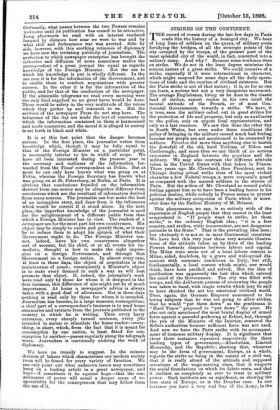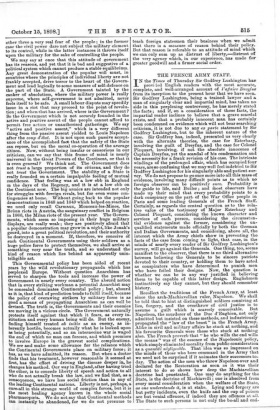STRIKES ON THE CONTINENT. T HE record of events during the
last few days in Paris reads like the history of a besieged city. We hear of long lines of soldiers on the quays, of military posts fortifying the bridges, of all the strategic points of the city occupied by the troops, of the greater part of the most splendid city of the world, in fact, converted into a military camp. And why ? Because some workmen were on strike. We do not in the least degree minimise the serious nature of a great strike. We could conceive of a strike, especially if it were international in character, which might suspend for some days all the daily opera- tions of trade and the routine of civilised existence. But the Paris strike is not of that nature ; it is, so far as one can learn, a serious but not a very dangerous movement. The average Englishman, living as he does in the classic land of strikes, cannot realise in his own mind the mental attitude of the French, or of most Con- tinental Governments, towards a strike. We have, it is true, seen the military called out in great strikes for the protection of life and property, but only as auxiliaries to the police, only on urgent local representation, and only as a last resource. We saw this done the other day in South Wales, but even under these conditions the policy of bringing in the military caused much bad feeling because our people are not accustomed to be overawed by soldiers. Peterloo did more than anything else to hasten the downfall of the old, hard Toryism of Eldon and Castlereagh ; and since then we can think of no serious encounter in England between the populace and the military. We may also contrast the different attitude taken in the United States with that taken in France. Three years ago Mr. Cleveland, then President, sent to Chicago during actual strike riots of the most violent character a few Federal troops, a mere corporal's guard as compared with the massed soldiers in the streets of Paris. But the action of Mr. Cleveland so roused public feeling against him as to have been a leading factor in his political decline, while nobody in France seems to protest against the military occupation of Paris, which is more- over done by the Radical Ministry of M. Brisson.
This phenomenon, we say, is so entirely wide of the experience of English people that they cannot in the least comprehend it. "If people want to strike, let them strike," is the ordinary English idea; "it is a free country, and strikes, while inconvenient, are not dangerous portents to the State." That is the prevailing idea here ; but obviously it is not so in most Continental countries. We have had this very year three very 'citable illustra- tions of the attitude taken up by three of the leading Powers towards disputes between labour and capital The Milan riots arose out of a local labour contest in Milan, aided, doubtless, by a grave and widespread dis- content with economic conditions in Italy, but still, fundamentally, a local contest which might, one would think, have been pacified and solved. But the idea of pacification was apparently the last idea which entered the mind of the Government. The city was filled with troops, and the deliberate process of overawing the people was taken in hand, with tragic results which may be said to have shocked the not too emotional civilised world. Then, again, the German Emperor announced to his loving subjects that he was not going to allow strikes, that he would "put them down" as the gentleman in "Hard Times" proposed to "put down" the poor. He also not only sanctioned the most brutal display of armed force against a peaceful gathering at Erfurt, but, through the pen of the Minister of the Interior, censured the Erfurt authorities because sufficient force was not used. And now we have the Paris strike with its accompani- ment of immense military display. It is significant that these three instances represent respectively the three leading types of government,—Absolutism, Limited Monarchy, and the Republic; showing that, whatever may be the form of government, Europe, as a whole, regards the strike as being in the nature of a civil war, that it is really afraid of the attitude and supposed intentions of the wage-earning class, that it suspects the social foundations on which its fabric rests, and that it inclines as completely as ever to trust in military power. Such incidents are as significant, as showing the true state of Europe, as is the Dreyfus case. In one instance you have a very real fear of the Army, in the other three a very real fear of the people ; in the former case the civil power dare not subject the military element to its control, while in the latter instances it throws itself upon the military for the sake of controlling the people.
We may say at once that this attitude of government has its reasons, and yet that it is bad and suggestive of a political system which cannot produce a stable equilibrium. Any great demonstration of the popular will must, in countries where the principles of individual liberty are not frankly accepted, drive terror to the heart of the Govern- ment and lead logically to some measure of self-defence on the part of the State. A Government tainted by the canker of absolutism, where the military power is really supreme, where self-government is not admitted, never feels itself to be safe. A small labour dispute may speedily issue in a riot that may proceed to the point of revolu- tion; and when that has arrived, where is the Government ? So the Government which is not securely founded in the active and positive assent of the people cannot afford to permit free action or unauthorised gatherings. We say "active and positive assent," which is a very different thing from the passive assent yielded to Louis Napoleon after the coup d'itat. It is not upon such passive accept- ance of the accomplished fact that the safety of the State can repose, but on the moral co-operation of the average citizen. Now, without being insular or censorious in our criticism, can we say that this frame of mind is nearly universal in the Great Powers of the Continent, or that it is even general ? We think not. The Government does not trust a large proportion of its citizens, and they do not trust the Government. The stability of a State is really founded on a certain impalpable feeling of mutual confidence. That feeling was at a low ebb in England in the days of the Regency, and it is at a low ebb on the Continent now, The big armies are intended not only for struggles with foreign rivals, but for even worse con- tingencies at home. Without going back to the popular demonstrations in 1848 and 1849 which helped on reaction, we need only recall Carmaux, Monceau-les-Mines, the Briinn riots in Austria, the sanguinary conflict in Belgium in 1886, the Milan riots of the present year. The Govern- ments, which seem so imposing in their huge military displays, are really weak ; they are positively afraid that a popular demonstration may grow in a night, like Jonah's gourd, into a great political revolution, and their authority be destroyed in a moment. If, therefore, we conceive of such Continental Governments using their soldiers as a huge police force to protect themselves, we shall arrive at something very near the truth, and so understand the kind of reason which lies behind an apparently unin- telligible act.
This Governmental policy has been aided of recent years by the wild revolutionary propaganda which has perplexed Europe. Without question Anarchism has served to sharpen the tools and increase the power of Government in nearly every country. The absurd notion that in every striking workman a potential Anarchist may be concealed dominates Continental policy ; but, absurd as it is, that kind of prediction tends to fulfil itself, because the policy of overawing strikers by military force is as good a means of propagating Anarchism as can well be devised. The truth is, the Governments and their enemies are moving in a vicious circle. The Government naturally protects itself against that which it fears, as every in- stitution and every human being will do. But the enemy, finding himself treated ab initio as an enemy, as in- herently hostile, becomes actually what he is looked upon as being potentially, and so Ein internecine war is waged the end of which no man can foresee, and which promises to involve Europe in the gravest social complications. We see and make some allowance for the reliance which the Continental Governments place on military force ; it has, as we have admitted, its reason. But when a doctor finds that his treatment, however reasonable it seemed at first, has the effect of driving the disease deeper in, he changes his method. Our way in England, after having tried the other, is to concede liberty of speech and action to all who do not actually break the law, and we find that, as a consequence, we have less social friction than in any of the leading Continental nations. Liberty is not, perhaps, a cure-all in this strange world of complex forces, but it is the most healing agency known in the whole social pharmacopceia. We do not say that Continental methods can instantly be abandoned, for we do not presume to teach foreign statesmen their business when we admit that there is a measure of reason behind their policy. But that reason is referable to an attitude of mind which we can only sum up as distrust of liberty,—distrust of the very agency which, in our experience, has made for greater goodwill and a firmer social order.







































 Previous page
Previous page